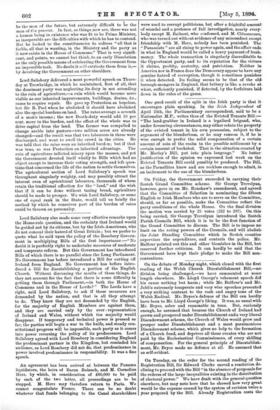Lord Salisbury delivered a most powerful speech on Thurs- day
at Trowbridge, in which he maintained, first of all, that the dominant party was neglecting its duty in not attending to the ruin of agriculture,—a ruin which would become more visible as our inherited improvements, buildings, drains, &c., came to require repair. He gave up Protection as hopeless, but Sir R. Peel when he abolished it should have abolished also the special burdens on land. The rates average a seventh of a man's income ; the new Death-duty would add 10 per cent. more to the burden, and the effect of the whole was to drive capital from the land. The farmer was compelled to change arable into pasture—two million acres are already changed—and the result was that two labourers in three were discharged, and went to swell the crowd in the cities. He was told that the rates were an inherited burden; but if that was tree, so was Protection an inherited advantage. The ruin of agriculture inflicted misery upon the masses, and yet the Government devoted itself wholly to Bills which had no object except to increase their voting strength, and left ques- tions that concerned the life of the nation to settle themselves. The agricultural section of Lord Salisbury's speech was throughout singularly weighty, and may possibly attract the interest even of agricultural labourers, thousands of whom retain the traditional affection for the " land," and the wish that if it can be done without taxing bread, agriculture should be made to prosper. We wish Lord Salisbury, or some one of equal rank in the State, would tell us briefly the method by which he conceives part of the burden of rates could be thrown on personalty.






































 Previous page
Previous page